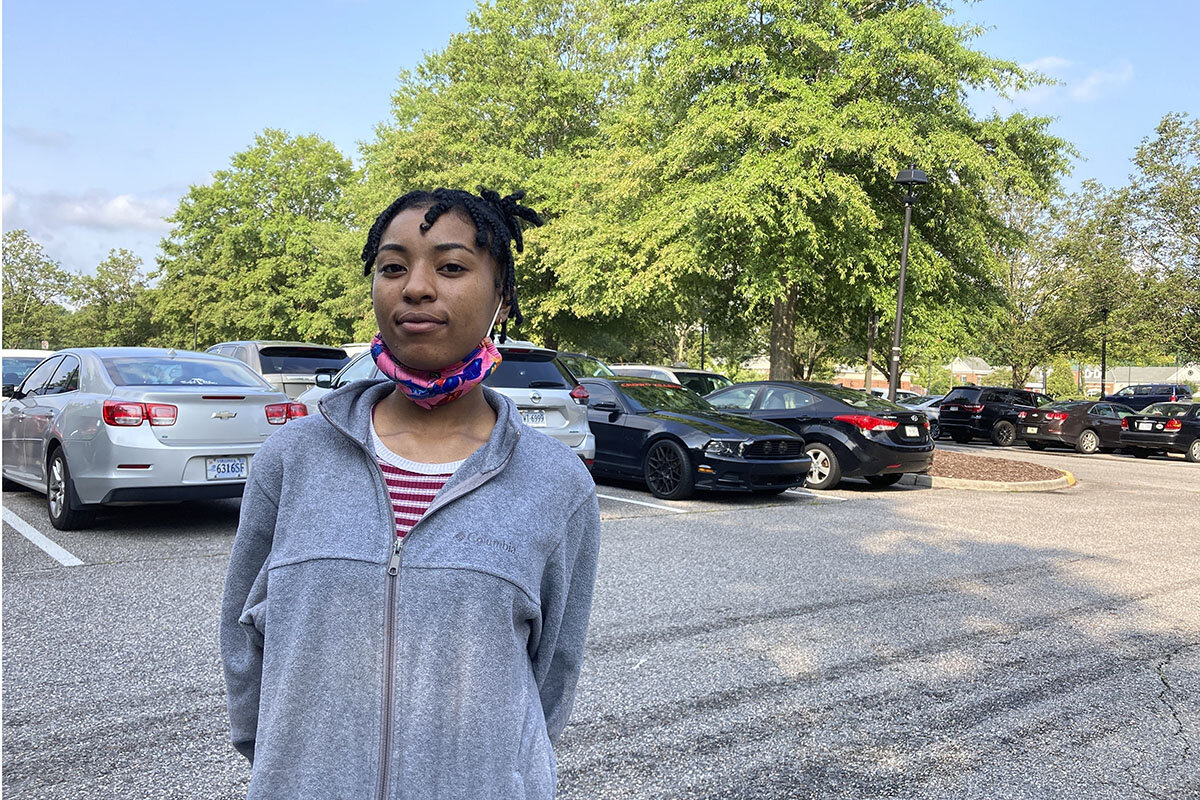A national model? How Virginia is improving landlord-tenant relations.
Loading...
| Alexandria, Va.
On Aug. 20, Cedric Simmons heard a knock on his apartment door south of the James River in Richmond, Virginia. A police officer served him a notice from his landlord: Mr. Simmons had until Sept. 9 to leave the apartment.
He was being evicted.
At that point Mr. Simmons owed almost $4,600 in back rent – the result of inconsistent income from gig work, day care costs for his daughter, and car repairs he needed this summer. Despite 16-hour workdays and trying to save up, he says, “it just kept spiraling out of control.”
Why We Wrote This
Virginia is proving that progress is possible, even on longstanding housing issues. Reforms that have reduced evictions could become a model for the nation during a new phase of the pandemic.
But on his notice there was a phone number to call for assistance. The people he spoke with referred him to the state’s rent relief program, and about a week later he heard back. A representative asked for documents and a trip to the courthouse, and in about five days, he received word that the state would cover his back rent. Mr. Simmons still had a home.
“If they didn’t step into place … I would probably be homeless,” he says.
Three years after Virginia made national news for having one of the highest eviction rates in the country, the state has responded with an array of new protections for tenants like Mr. Simmons. The General Assembly has passed nearly two dozen bills – many with bipartisan support – resetting the relationship between tenants and landlords. To date, Virginia has distributed the nation’s highest share of pandemic rent relief money allocated by Congress.
“The two are just inextricably linked: The success of Virginia in getting out rent relief money is a direct result of national exposure of Virginia having so many cities with a high eviction rate,” says Marty Wegbreit, director of litigation at the Central Virginia Legal Aid Society.
With the Supreme Court’s rejection of the Centers for Disease Control and Prevention’s latest eviction moratorium, which could contribute to a potential by the end of the year, such aid and advocacy is as important as ever. Once a cause of shame for being insufficient, Virginia’s tenant protections have become a role model. Other states may benefit from following its example.
“We’d like to see them do that,” says Mr. Wegbreit.
Embarrassment leads to progress
Just three years ago, Mr. Wegbreit was fretting over research that showed a very different picture of Virginia’s housing landscape.
Princeton University’s Eviction Lab had released a ranking of the country’s . Of those, Virginia had three of the top five and five of the top 10. Richmond, the capital, had the second-highest eviction rate in the country.
Virginia made “the national news in a way that no state and no city ever wants to,” says Mr. Wegbreit.
With proper checks and balances, eviction is an important shield, protecting landlords from careless tenants. But that shield can too easily become a sword, says Alieza Durana, narrative change liaison for Princeton’s Eviction Lab. Landlords can use the threat of eviction to coerce tenants – often unaware of their legal rights – into paying rent immediately or ignoring problems in their apartments. There’s already a national for low-income renters. If evicted, tenants can fall into a cycle of poverty and homelessness.
The challenge for lawmakers, says Ms. Durana, is writing policy that protects both parties. That task is even more difficult in a rental landscape that spans “mom and pop” landlords trying to pay down mortgages on the one hand and profit-hungry serial evictors on the other, who target the same tenant for eviction repeatedly. Eviction should be “a tool of last resort,” says Ms. Durana, but in many places it is wielded as “a rent collection tool.”
The Eviction Lab’s 2018 report showed how much eviction was being misused in Virginia and signaled a power imbalance between the state’s renters and landlords, says Mr. Wegbreit. Immediately, he says, “a lot of attention got focused on trying to improve the situation for Virginia tenants.”
During the following fall and spring a Republican-controlled General Assembly passed seven or so tenant-friendly laws signed by Democratic Gov. Ralph Northam. That trend continued in late 2019, when Democrats took over both houses of the state legislature. The reforms afforded tenants more time to pay down back rent, gave them more power to obtain timely repairs in their apartment, and prevented landlords from charging egregious late fees.
An instructive coincidence
Virginia was still remedying its eviction problems when the pandemic began in March of last year. That helped the state connect the two crises, and gave its prevention efforts a kind of kinetic energy. In the year and a half since, Virginia’s eviction policies have been proactive, says Benjamin Teresa, co-director of the RVA Eviction Lab at Virginia Commonwealth University’s L. Douglas Wilder School of Government and Public Affairs.
Perhaps most important, the state was one of the nation’s first to launch a rent relief program last summer. At first only distributing state funds, the program had almost half a year to troubleshoot the process before Congress allocated billions of dollars in in January. By then, says Mr. Wegbreit, the state had learned how to disburse funds efficiently.
To date, Virginia has distributed the highest percentage of rent relief funds in the country and the second highest total, next to Texas, says Mr. Wegbreit. Last month Governor Northam restarted the state’s eviction moratorium, which requires landlords to apply for rent relief before they can evict a tenant for nonpayment. The moratorium lasts until next June.
The state government has also passed laws requiring landlords to give 14 days of nonpayment notice, up from five, before filing an eviction case, and banning discrimination based on source of funds – meaning landlords can’t deny tenants because they’re receiving rental assistance.
RVA Eviction Lab’s research shows that eviction filings fell to during the second quarter of this year.
“Virginia is ahead of the curve when it comes to ... the rent relief program,” says Laura Dobbs, a housing attorney at the Virginia Poverty Law Center. But “that’s only such a small slice” of the eviction landscape.
When tenants need assistance to pay rent, landlords can still choose not to renew their lease – bypassing the legal eviction process but still contributing to housing instability. Tenants also often struggle to corral the necessary paperwork to apply for rent relief or aren’t aware of their rights in the first place.
Even if they are informed, tenants may accept poor treatment if the alternative is homelessness, says Omari al-Qaddafi, a community organizer and housing advocate at Richmond’s Legal Aid Justice Center.
“The landlord has the key,” says Mr. Qaddafi. “He or she is standing in between you and your family being out on the street.”
“Those people are my angels”
The rent relief program helps avoid such a zero-sum game.
Renee Pulliam works as director of operations for residential property services at Cushman and Wakefield, Thalhimer, which leases around 10,000 apartments in Virginia, she says. Of those, around 1,500 have received rental assistance.
The first applications came last August, when the program was still in its infancy. It’s become more streamlined since then, says Ms. Pulliam, and applying for rental assistance is now a normal part of her company’s process.
“If there is rental assistance available and our residents have been impacted and they qualify for the assistance, we are absolutely going to help them secure the funds,” she says.
For Mr. Simmons, who spoke with the Monitor Sept. 9, the day he was scheduled to be evicted, those funds have brought unspeakable relief.
He’s studying for an exam that could help him land a more stable job in information technology by the end of the year, and he’s saving money.
“I’m able to see myself in a completely different place by January,” he says.
After months of anxiety about paying his bills, feeling with every hour worked that he would still fall short, and having it all erased in two weeks, he operates with a new sense of thanks.
“Those people [who helped me apply for rent relief] are my angels, in my eyes,” says Mr. Simmons. “They will never be forgotten for the rest of my life.”









